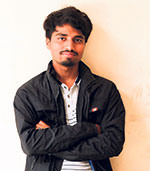“My mother pointed at the TV screen and expressed that it would be a proud moment to any mother if her children appeared on the TV for an interview. It was the turning point in my life. I wanted to make my mother proud,” stated Bikalpa Dhungana, a 19-year-old scientist, and inventor from Manpang, Tanahun.

He realized his passion when he found himself inseparable from science. Since getting hooked to science, he has invented a number of devices, including the Anyway Military Vehicle which can be operated in water, land, and sky, Sobi Anti-alcohol Vehicle Protecting System (SAAVPS), earthquake alarm device, smart mask, traffic lights systems, and many more. All his inventions are based on real incidents of his life.
NAST at work to publish directory of Nepali scientists and tech...

Dhungana completed SAAVPS after his aunt and uncle died in a bike accident. It was his vision to work on minimizing road accidents in Nepal. “The sensor SAAVPS is a two-wheeler anti-alcohol vehicles protecting system. If we use this technology, we can control road accident – a leading cause of death around the globe. The device comprises two sensors placed in the helmet. If the rider is either intoxicated or not wearing the helmet, the device will trigger the bike to stop automatically,” he shared.
However, he had to go through a series of hindrances in forms of rejections. He was once let down by the Nepal Academy of Science and Technology (NAST) because of his small age. Likewise, he also had to face problems while making a solar-powered scooter. Due to the lack of budget to invest in materials, he had to drop down the project. But finally, after getting financial help from his home, he completed the solar-powered scooter.
Acknowledging his works and dedication in science, he was awarded the ‘Yuba Pratibha Puraskar’ in 2015 by the Ministry of Youth and Sports, followed by top 10 national vision award (Youth Hunt Talent) 2017, and Junior Scientist Award in the same year.
He has piloted science and technology training in around 200 schools in Nepal. He wants to encourage young innovators to pursue science showing the possibilities of the subject. He also inspires the young student to invent something new and challenge their knowledge. He believes that knowledge should not be limited, and one should look to learn from anyone, at any given time, and place. “I get to learn something from every person I meet in life,” he said.
In future, he plans to continue his studies in either USA or Philippines. However, he ensured, “I will return to Nepal after completing my education to contribute to Nepal’s science and technology.”






































